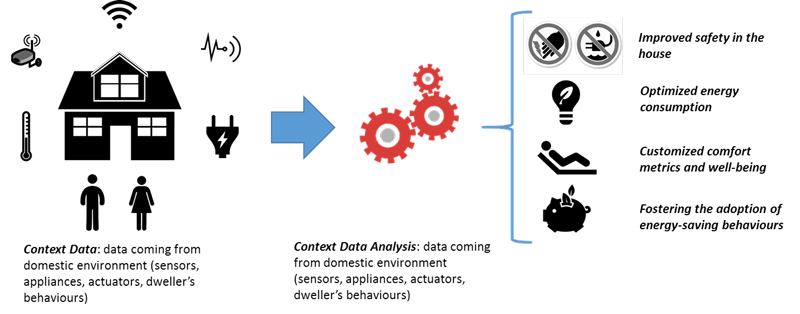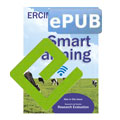by Daniele Spoladore, Enrico G. Caldarola, Atieh Mahroo and Gianfranco E. Modoni (ITIA-CNR)
The CasAware research project combines context awareness with ambient assisted living by using a semantic-based framework that enables the smart home paradigm for everybody.
In traditional home design, collaboration among appliances is often neglected: each appliance performs its tasks and provides its services in isolation, with very limited exchange of information – or none at all. This approach hinders that development of home automation and customisation of domestic services embodied by the smart home paradigm. In fact, in the smart home, domestic appliances should cooperate in a distributed and interconnected system, by acquiring context data and processing them in order to provide customised services. In this context, the CasAware project tries to implement the smart home paradigm exploiting a semantic-based system grounded on a set of ontologies named “CasAwareOnt”.
By exploiting first-order logic based languages (RDF and OWL), the CasAware’s system leverages the formal representation of concepts and relationships belonging to different knowledge domains, such as domestic sensors (e.g., CO2 concentration, indoor temperature, indoor illuminance, etc.), the expected behaviour of appliances (programs, actuator responses, etc.) and residents’ preferences (when and how to activate specific programs, preferred comfort metrics, etc.). This knowledge is formally represented in the CasAwareOnt and is expected to grow over time, according to the modifications of residents’ preferences – which are identified by monitoring inhabitants’ interactions with the appliances and the house. The ability to detect new preferences so that they can be suggested to the residents and added to the CasAwareOnt (thus dynamically updating the knowledge-base), is achieved by exploiting machine-learning techniques in addition to semantic reasoning capabilities. The inhabitants can interact with the system via an app, which acts as the main interface and can be operated via tablet or smartphone, allowing remote management of the house as well.
Residents can take advantage of CasAware to help manage several domestic tasks, such as supervising the energy consumption of the appliances and preventing unexpected power-cuts: in fact, CasAwareOnt provides a description of the energy required by each appliance and programs to run and matches the current consumption with the set power threshold. If the activation of a new device generates a power-cut by surpassing the power threshold, the application warns the dweller and prevents the device from turning on. Notifications via app can also be used to warn the inhabitants when potential energy wastage is detected – for instance, if the A/C system is on and a window is accidentally left open. The system can also access several open-data sources to provide tailored services and help the inhabitants with their daily activities. For instance, the CasAware system is aware of the inhabitant’s habits, such as wake up time and time required to get to the workplace and the route usually taken. The CasAware system is able to acquire information regarding the traffic and weather conditions, then analyse traffic delays and set the alarm to go off early to prevent the dweller from getting to work late.

Figure 1: Overall approach of CasAware.
CasAware is able to monitor the dwellers’ behaviour and to provide customised services relating to their safety in the house, appliance management and energy consumption management. CasAware can also manage the residents’ health-related data: this can be particularly interesting for ambient assisted living (AAL) solutions. In fact, AAL aims at providing elderly people or those with disabilities with a set of services and appliances capable of anticipating and responding to the specific needs of the inhabitants, taking advantage of tailored services provided by diverse devices. CasAwareOnt can be enriched with the knowledge regarding the physiological status of the dwellers – formalised using the World Health Organisation’s International Classification of Functioning, Disability and Health – while semantic reasoning can be leveraged to provide the most suitable solution for each inhabitant, according to the individual’s needs [1].
CasAware continues the work of the “Design For All” project [2] by enhancing the semantic-based framework and extending its use to real-time monitoring of the domestic environment, while preserving and specialising the AAL vocation of these solutions. The whole system benefits from the seamless integration of the devices leveraged by the semantic-based architecture [3], while the monotonicity of semantic reasoning is overcome by adopting machine-learning techniques. A pilot CasAware system is being developed in the CNR’s Living Lab, which will allow us to acquire invaluable insights into potential issues and bottlenecks and to test solutions in new scenarios.
CasAware is a research project approved by Lombardy Region (ID 147152) involving the Institute of Industrial Technologies of Automation (ITIA) of the Italian National Research Council with two ICT companies – Teorema Engineering and S@it.
References:
[1] D. Spoladore, “Ontology-based decision support systems for health data management to support collaboration in ambient assisted living and work reintegration”. In Working Conf. on Virtual Enterprises, Springer, Cham.
[2] D. Spoladore, S. Arlati, and M. Sacco, “Semantic and Virtual Reality-Enhanced Configuration of Domestic Environments: The Smart Home Simulator”, Mobile Information Systems.
[3] M. Sacco et al., “Supporting the design of AAL through a SW integration framework: the D4All project”, in International Conf. on Universal Access in Human-Computer Interaction.
Please contact:
Daniele Spoladore, ITIA-CNR, Italy










